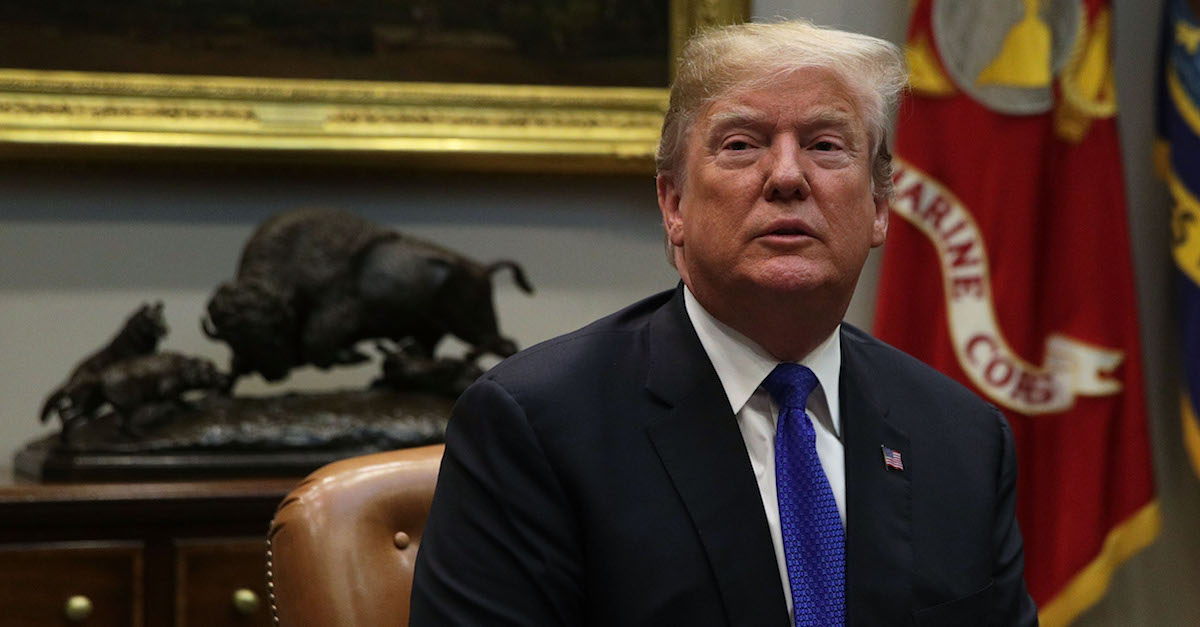
By now, we’re all very familiar with the nondisclosure agreement that Stormy Daniels signed to remain silent regarding an affair she claims she had with Donald Trump in 2006. While Daniels is in court trying to get out of her deal, two other people in somewhat similar situations were granted permission to tell their stories once the 2016 election was no longer an issue. That timing sure doesn’t look good as Trump and his lawyer Michael Cohen fend off accusations of campaign finance violations.
Former Playboy Playmate Karen McDougal may be suing for the ability to sell her story to other outlets after agreeing to give exclusive rights to National Enquirer parent company AMI, but AMI already amended their deal to let her respond to media inquiries about her alleged affair with Trump. In more recent news, former Trump Tower doorman Dino Sajudin also had a deal with AMI where he sold them the rights to a story that Trump had another affair in the 1980s that allegedly produced a love child. Sajudin collected $30,000 in exchange for the story, which AMI opted not to publish. Sajudin was eventually let out of his deal, with AMI claiming the story wasn’t credible.
Regardless of whether the Sajudin or McDougal stories are true, the fact that they were eventually allowed to talk about them — and the timing that these permissions were granted — seem to shed light on the motivations behind the deals. Motivations that could spell trouble for Team Trump, as Cohen is alleged to have been involved in discussions surrounding the McDougal and Sajudin deals, and he was the one who made the Daniels deal.
McDougal was originally prohibited from talking about her story at all, but the day before the 2016 presidential election she hired a new pro bono lawyer who later negotiated the amended deal that lets her respond to media questions.
According to The Washington Post, Sajudin was released from his contract in “late 2016.”
Trump and Cohen, meanwhile, are facing complaints filed with the Federal Election Commission that claim that the payments made to McDougal and Daniels were really in-kind contributions to the Trump campaign, since they were done to keep potentially damaging information away from the public while Trump was running for president. If the FEC does deem either of these payments to be campaign contributions, they would exceed the maximum amount that people are allowed to contribute under federal law. Additionally, if Trump knew about the payments, he and his campaign would be in violation for not reporting them to the FEC.
One defense that Trump may have had available is one that John Edwards used in a similar situation after he ran for president in 2008. In the Edwards case, his mistress was paid to remain silent, but Edwards said any effort made to keep the affair under wraps was to protect his family, not his campaign.
It appears that this defense would now be difficult for Trump to make, if Cohen was indeed involved in the AMI deals with McDougal and Sajudin. The fact that McDougal and Sajudin were allowed to talk about their stories after the election seems to indicate that the motivation behind their initial deals was to keep them quiet before the election, and not to protect Trump’s family. As former federal prosecutor Daniel Goldman said on Twitter, this could be evidence that the deals violated campaign finance laws.
The fact that AMI let both the doorman and the playmate out of their NDAs right after the election would be helpful evidence in a campaign finance prosecution – shows that the purpose was to hide the information from the voting public in advance of the election. https://t.co/CPceGYswyR
— Daniel S. Goldman (@danielsgoldman) April 13, 2018
With reports that the warrant used for the raid on Cohen’s office dealt with communications related to “negative publicity” about Trump, it appears the FBI could be thinking the same thing.
[Image via Alex Wong/Getty Images]
Have a tip we should know? [email protected]